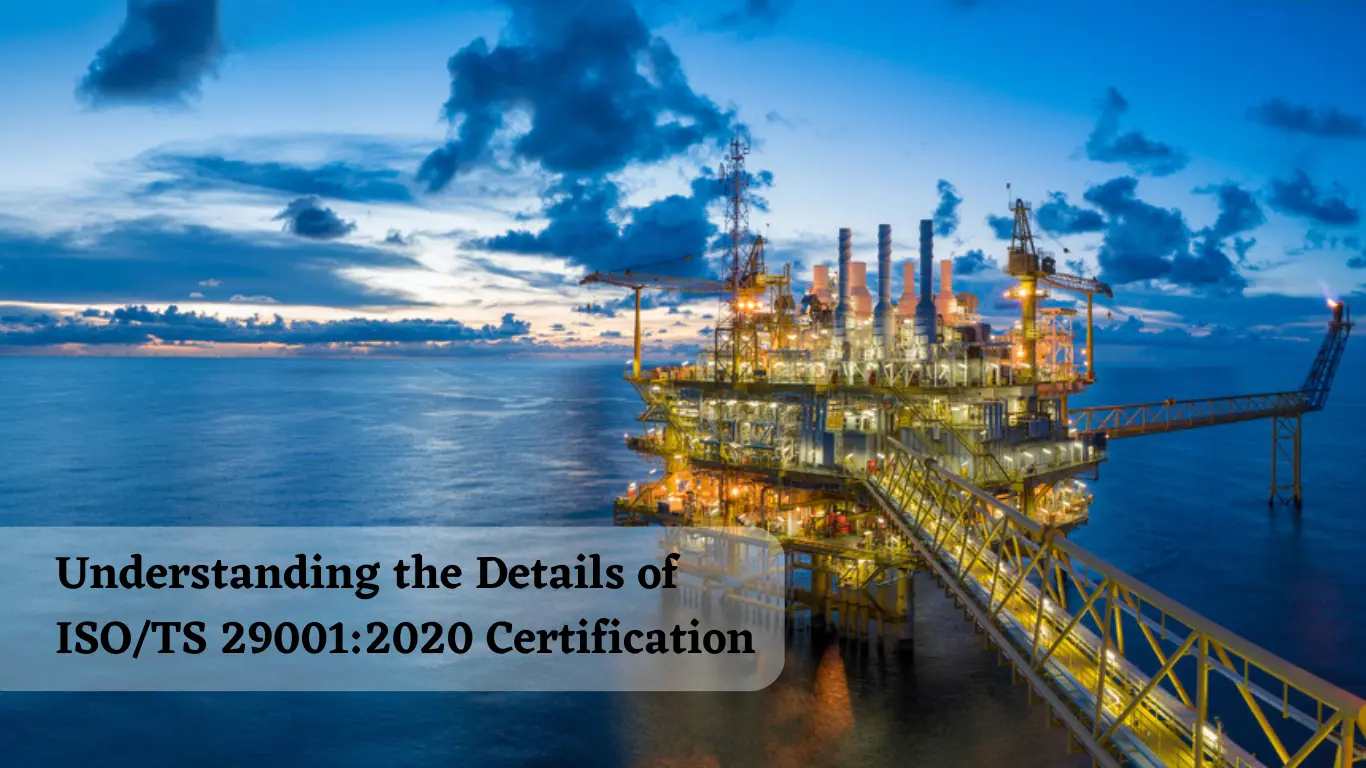If you are in need of ISO/TS 29001:2020 Certification and are about to apply, getting a fundamental understanding of the certification and its function will be necessary. This certification applies specifically to the petroleum, petrochemical and natural gas industries. Since 2003, the oil and gas sector has applied its own quality management system. This certification is for product and service supply organisations and technical specifications for suppliers.

What is ISO/TS 29001:2020, and how will it work?
The specification supplement ISO 9001 offers general requirements. The publication of ISO 9001:2015 instigated the revision of ISO/TS 29001:2010 by the oil and gas industry. This step transformed the document and made it ISO standard. ISO 29001:2020 got published in 2020. More specifically on 15th May of the year and is now available for implementation.
At the time of its introduction, ISO 9001:2015 initiated a change in the existing practices, redefining the way quality management systems get implemented across industries. The update considered major advances in the information and data management sector. It also sets up accountabilities for the top management so that the organisations can implement a consistent process-based approach. This will ensure that processes can now be tailored, implemented and verified according to the organisation, product and service risk.
Some details and fundamentals for a better understanding
ISO 9001:2015 is designed to offer an impressive and effective risk-based management system framework. The certification proved indispensable when implemented by the oil and gas industry as a key strategy to meet the competitive challenges to realise opportunities and manage associated risks. After the publication of ISO 29001:2020, the oil and gas industry is aligned with ISO 9001:2015 completely. This latest iteration includes the latest working practices. It initiates a risk-based approach to how organisations specify and implement the requirement of quality management systems within their supply chains.
The added value of ISO/TS 29001:2020 – in a nutshell
The ISO/TS 29001:2020 Certification fully imbibes the ISO 9001:2015 certification. It offers additional requirements and guidance while creating added value for the oil and gas industry. The following points will highlight this matter further, and they are:
- Now, the best practices in the sector can be implemented with verifiable requirements and guidance. It will ensure the implementation of the PDCA or consistent process approach.
- It is now possible to ensure that the processes systematically identify the organisational and specific product and service risks to improve safety, reliability and performance. This includes refraining from introducing unnecessary complexity where the level of risk is within the acceptable capacity. If the level of risk is not within acceptable limits, a risk management process is to be incorporated to remove, modify or mitigate risk, and ensure the involved parties understand their accountability in managing the risks.
- Risk-based assurance and verification programme options are now allowed.
A new annexe to deal with conformity assessment for enabling customers to select their verification involvement and organisations to find their verification requirements for any externally provided products, services or processes will be incorporated now. - There will be datasheet options to minimise the organisations’ needs for specific quality requirement documents for every contract they create for products and services.
- It also recognises organisations implementing customer-approved QMS for products and services already covered under a complementary QMS standard. This standard ensures compliance with the technical standards and will meet the ISO/TS 29001:2020 Certification requirements.
Implementation of the certification within the gas and oil industry
Currently, the gas and oil sector is developing additional documents to support the implementation of ISO 29001:2020 within the industry. These documents are designed to describe the competence requirements for the audits and certification of the sector-specific management systems. It will also include the harmonised rules to assess conformity to ISO 29001:2020. All these additions will ensure that the ISO 29001 certificates can be trusted and added value will be created for the organisations, supply chains and stakeholders.
Professional assistance is necessary to acquire the ISO/TS 29001:2020 Certification
In short, if you have a business in the oil and gas sector or have plans to become part of the industry, understanding and then applying for ISO/TS 29001:2020 Certification is necessary. Without prior knowledge and experience, it will be tough to manage the process of acquiring the certification, yet you will need it. Therefore, seeking professional assistance will be the right choice. At ISO Management Consultant, we have been helping organisations acquire, manage and renew their ISO certifications for quite some time. Please browse our website to learn more. Contact us to set up an appointment where we can discuss your organisation and the plans you have for it.
